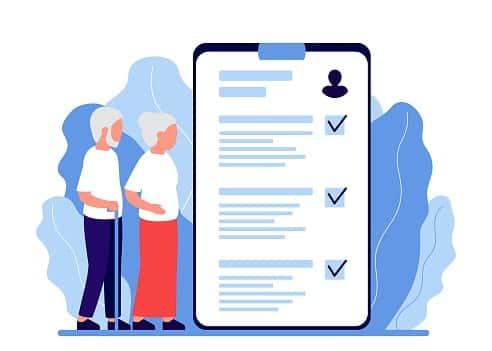- What is a cash-only doctor?
- Can primary care doctors refuse to take insurance?
- What to do when your doctor doesn't accept your insurance
- Why do some doctors not take insurance?
- How does seeing a cash-only doctor affect your insurance?
- Direct primary care vs. cash-only medical practices
- What to do when your doctor doesn't take Medicare
- How much is a doctor's care without insurance?
- Frequently asked questions
What is a cash-only doctor?
A cash-only doctor is a medical provider who does not accept insurance. Cash-only doesn't mean they only accept cash; they will also accept credit and debit cards in most cases.
Cash-only doctors do not bill insurance companies, and you are responsible for paying your medical bills directly to the provider.
Can primary care doctors refuse to take insurance?
Yes. Doctors aren't required to accept health insurance plans or to accept the rates insurance companies decide to pay. The Affordable Care Act improved health insurance access, but it didn't resolve the issue of rising costs and lower reimbursements offered by some payers.
Many choose not to work with particular insurers or government payers like Medicare and Medicaid that offer lower reimbursements to doctors. The financial challenges and increasing operational costs of running a medical practice have led many physicians to refuse participation in these programs. Instead, they may move to cash-only medical practices.
"It's becoming more common lately. Insurance companies are denying claims and making it harder for doctors to accept patients in their plans by lowering reimbursements. Consequently, lots of doctors are dropping plans," says Lily Talakoub, MD, FAAD, a board-certified dermatologist in McLean, Virginia.
What to do when your doctor doesn't accept your insurance
If a doctor or a hospital doesn’t accept your health insurance, there are a few steps you can take.
Contact your insurance company
Reach out to your insurance company. You can explain the situation and ask for an appeal. Sometimes, the insurance company will agree to negotiate with your doctor.
But if the issue is that the doctor doesn’t want to accept funds from an insurance company, you’ll have no choice but to pay cash or find a different doctor. Your insurance company can provide a list of in-network doctors that are accepting new patients.
Check your network coverage
"Chances are, the services you require are available in your network from an alternative physician or service provider in your area who accepts your insurance," says Nick Schrader, an insurance agent with Houston-based Texas General Insurance. "If so, try to see that doctor instead."
Ask your doctor’s office if it will submit your insurance claim
"If your physician is outside of your insurance network coverage, ask if they will submit an out-of-network claim as a courtesy to you," Talakoub says. "If not, ask if they will provide documentation that can help you submit a claim yourself with the necessary paperwork and documentation attached."
Request a reduced fee or flexible repayment terms
If a doctor doesn’t accept insurance, they may be willing to negotiate payment terms with the patient. You might score a discount for paying upfront or find flexible financing options if you ask the front desk.
Ask if the doctor offers concierge medicine options
Your healthcare provider may agree to provide treatment and services for an annual, monthly, or regular prepaid fee. The concierge medicine model serves fewer patients, allowing healthcare providers to offer more personalized care.
Consider switching insurance plans
Your doctor may accept a new plan or policy with a different carrier. Confirm with the provider what health insurance plans the practice accepts.
Inquire about payment assistance options
"Check to see if the practice or hospital has financial assistance options that can reduce or eliminate your bill, depending on your financial need, and determine whether you are eligible to acquire that," Schrader says. "If you qualify, you'll probably have to pay something out of your pocket, but very minimal."
Go to an urgent care clinic instead
Walk-in clinics that provide non-emergency services may charge a lot less than private practices, hospitals, or medical centers.
Why do some doctors not take insurance?
Some doctors don't take insurance for several reasons, including:
- The difficulty of working with insurance companies and the rates set by those companies. Physicians negotiate the price of treatment with health insurers. The health insurance company sets the rates that it will pay the doctor. Insurance companies may also include quality metrics that doctors must meet for full reimbursement. Insurers set rates, but that doesn't mean the physician must agree to these rates. Lower reimbursements from insurers have prompted some doctors to stop accepting plans and coverage from those insurers.
- The dynamics of physician movements within insurance networks. Doctors may leave practices, change jobs, or opt out of accepting certain insurance plans, leading to increased costs for patients when seeing out-of-network providers or the necessity of finding a new in-network doctor.
- The paperwork associated with insurance companies. Each patient with insurance comes with an extensive amount of paperwork. Plus, many insurance companies try to deny coverage at every turn. Ultimately, this leads to hiring more staff to manage the paperwork or tackling the paperwork nightmare on their own.
When health insurers lower reimbursement rates, Talakoub says, insurance companies force doctors to see more patients, which isn’t good for patient care.
"The doctor's office then becomes a factory and patients suffer," Talakoub says. "Also, insurers commonly don't approve medications or tests that doctors recommend, making the administrative burden horrendous for doctors to deal with as they try to appeal their decisions as advocates for their patients."
People ask
Can you still go to the hospital without insurance?
Yes. Emergency rooms are required to treat patients regardless of insurance status.
How does seeing a cash-only doctor affect your insurance?
Seeing a cash-only doctor generally won't affect your insurance. Because there is no interaction between the provider and the insurance company, and no claim, there's no impact on your insurance.
However, it's important to be aware that some health insurance plans require you to see an in-network primary care provider for any referral to a specialist. A cash-only doctor who doesn't accept your insurance and isn't part of your network can still refer you, but that referral may not be covered by your insurance.
Direct primary care vs. cash-only medical practices
With all of the difficulties of dealing with insurance companies, more doctors have stopped taking insurance.
Of course, someone has to pay the tab. When physicians decide to stop taking insurance, patients have to foot the bill.
Doctors who request cash payments effectively cut out the extensive paperwork requirements of the insurance company, which means less of an administrative burden on the doctor and their staff.
Some practices charge patients a flat or reduced/sliding scale fee for office visits and treatment. Others offer "concierge medicine," in which patients pay a monthly, quarterly, or yearly fee or retainer for a predetermined number of services or visits.
Direct primary care is one type of program in which the patient and health care providers set up a financial arrangement. Direct primary care removes health insurance from the equation. So, the provider doesn't file health insurance claims but instead works directly with the patient through a monthly or membership fee.
The benefit of direct primary care is that you won’t have to deal with health insurance companies. Direct primary care physicians can provide longer visit times and improved doctor-patient relationships, fostering price transparency and accessibility. This model allows for longer visits, improved doctor-patient relationships, and more accessible communication methods such as telemedicine.
People ask
How do you know if a doctor takes your insurance?
The best way to find out of a doctor takes your insurance is to call their office and ask. Verify insurance coverage before you see a doctor so you aren't responsible for the bill.
What to do when your doctor doesn't take Medicare
Most doctors accept Medicare. Only 1% of all non-pediatric physicians formally opted-out of the Medicare program in 2020, according to the Kaiser Family Foundation.
Medicare doesn't pay at the same rate as private insurers. Doctors who accept it are often only reimbursed around 80% of what private health insurance pays. This is one of the reasons why some physicians don't accept Medicare.
But if you learn that your healthcare provider doesn't take Medicare, you have options. Perhaps you could negotiate a discounted or sliding scale fee or see if the practice offers flexible financing options. As a last resort, be prepared to find another doctor who accepts Medicare; ask your physician for a referral to a fellow practitioner who does.
People ask
Do doctors choose what insurance they take?
Yes, to a certain degree. A doctor can choose to be part of a certain network, or to work within an HMO, which will define what insurance they take.
How much is a doctor's care without insurance?
The cost of a visit to a doctor varies widely, depending on the medical specialty and reason for the visit.
According to Johns Hopkins Bloomberg School of Public Health, the average cost of a primary care doctor visit without insurance is $160. However, cash-only doctors may offer reduced fees since they have cut out the costs of dealing with insurance companies.
Health insurance finder tool

COBRA
Learn more about COBRA
How much is your annual household income?
How many members are in your household?
Medicare
Medicare costs vary depending on which option you choose.
Learn more about Medicare costs.
Medicaid

Parent's employer-sponsored health insurance

Spouse's employer-sponsored health insurance

Employer-sponsored health insurance

Preferred-provider Organization (PPOs)
Preferred-provider organization (PPOs) plans are the most common type of
employer-based health plan. PPOs have higher premiums than HMOs and HDHPs, but
those added costs offer you flexibility. A PPO allows you to get care anywhere
and without primary care provider referrals. You may have to pay more to get
out-of-network care, but a PPO will pick up a portion of the costs.
Find out more about the differences between plansHealth maintenance organization (HMO)
Health maintenance organization (HMO) plans have lower premiums than PPOs.
However, HMOs have more restrictions. HMOs don't allow you to get care outside
of your provider network. If you get out-of-network care, you'll likely have to
pay for all of it. HMOs also require you to get primary care provider referrals
to see specialists.
Find out more about the differences between plansHigh-deductible health plans (HDHPs)
High-deductible health plans (HDHPs) have become more common as employers look
to reduce their health costs. HDHPs have lower premiums than PPOs and HMOs, but
much higher deductibles. A deductible is what you have to pay for health care
services before your health plan chips in money. Once you reach your deductible,
the health plan pays a portion and you pay your share, which is called
coinsurance.
Find out more about the differences between plansExclusive provider organization (EPO)
Exclusive provider organization (EPO) plans offer the flexibility of a PPO with
the restricted network found in an HMO. EPOs don't require that members get a
referral to see a specialist. In that way, it's similar to a PPO. However, an
EPO requires in-network care, which is like an HMO.
Find out more about the differences between plans
Learn more about individual insurance plans
Sources
- Johns Hopkins Bloomberg School of Public Health. "Primary Care Visits Available to Most Uninsured but at a High Price." Accessed August 2025.
Frequently asked questions
What if my doctor doesn’t accept Medicaid?
If your doctor doesn’t accept Medicaid, ask if they accept other insurance options. If paying for a different insurance policy or covering out-of-pocket medical costs is not possible, then it’s time to switch providers. Check out your state’s Medicaid website to see which doctors in your area take Medicaid.
Why do doctors refuse Medicaid patients?
Doctors may refuse Medicaid patients because they are not contracted with Medicaid.
Can you submit a claim if your doctor doesn’t accept insurance?
Yes. You can submit a claim for reimbursement to your insurance company. It will generally be reimbursed based on out-of-network coinsurance amounts. However, with some health insurance plans, particularly HMOs, out-of-network care is not covered at all.
Can an in-network provider refuse to bill insurance?
No, generally not. They are under contract with your insurance provider and have agreed to bill for your care. There may be some situations where a visit to an in-network doctor may not be billed to insurance, but it's unusual.












